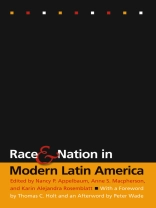This collection brings together innovative historical work on race and national identity in Latin America and the Caribbean and places this scholarship in the context of interdisciplinary and transnational discussions regarding race and nation in the Americas. Moving beyond debates about whether ideologies of racial democracy have actually served to obscure discrimination, the book shows how notions of race and nationhood have varied over time across Latin America’s political landscapes.
Framing the themes and questions explored in the volume, the editors’ introduction also provides an overview of the current state of the interdisciplinary literature on race and nation-state formation. Essays on the postindependence period in Belize, Brazil, Colombia, Cuba, Mexico, Panama, and Peru consider how popular and elite racial constructs have developed in relation to one another and to processes of nation building. Contributors also examine how ideas regarding racial and national identities have been gendered and ask how racialized constructions of nationhood have shaped and limited the citizenship rights of subordinated groups.
The contributors are Sueann Caulfield, Sarah C. Chambers, Lillian Guerra, Anne S. Macpherson, Aims Mc Guinness, Gerardo Rénique, James Sanders, Alexandra Minna Stern, and Barbara Weinstein.
关于作者
Karin Alejandra Rosemblatt is associate professor of history at Syracuse University.












